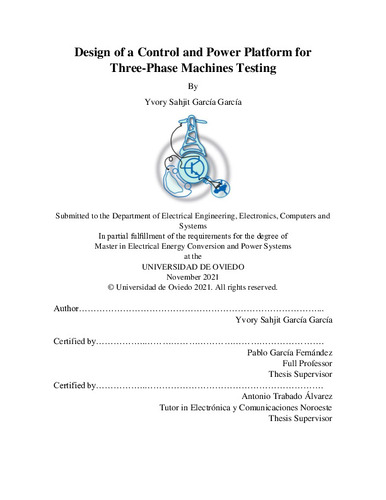Design of a control and power platform for three-phase machines testing
Autor(es) y otros:
Director(es):
Fecha de publicación:
Serie:
Máster Universitario en Conversión de Energía Eléctrica y Sistemas de Potencia
Descripción física:
Resumen:
With the increase in performance and decrease in price of power electronics devices, the production and development of them is on the highest demand nowadays, and thus generic and flexible hardware and software tools are mandatory in industry. This master thesis presents the development of three main tools. First, a digital framework for electric machines control with the simulation in Matlab/Simulink of the FOC of an IPMSM and development of the algorithm modularly and from scratch in bare-metal C. Second, a flexible power controller board based on an STM32 microcontroller with isolated PWM, variable gain and isolated analog ports, GPIOs, motor speed sensor interfacing and communication ports such as SPI, RS485, CAN-FD, Ethernet and USB. Lastly, a flexible three-phase inverter is designed on one hand in order to fulfil the requirements of a real project and client and on the other hand to serve as the drive for different 3-phase machines on the workshop. The developed hardware has been proved to work mostly as expected, integrating the controller board with different power converters, including the developed one, while also integrating the developed software library achieving to validate most of the functions.
With the increase in performance and decrease in price of power electronics devices, the production and development of them is on the highest demand nowadays, and thus generic and flexible hardware and software tools are mandatory in industry. This master thesis presents the development of three main tools. First, a digital framework for electric machines control with the simulation in Matlab/Simulink of the FOC of an IPMSM and development of the algorithm modularly and from scratch in bare-metal C. Second, a flexible power controller board based on an STM32 microcontroller with isolated PWM, variable gain and isolated analog ports, GPIOs, motor speed sensor interfacing and communication ports such as SPI, RS485, CAN-FD, Ethernet and USB. Lastly, a flexible three-phase inverter is designed on one hand in order to fulfil the requirements of a real project and client and on the other hand to serve as the drive for different 3-phase machines on the workshop. The developed hardware has been proved to work mostly as expected, integrating the controller board with different power converters, including the developed one, while also integrating the developed software library achieving to validate most of the functions.
Colecciones
- Trabajos Fin de Máster [5284]
Ficheros en el ítem





